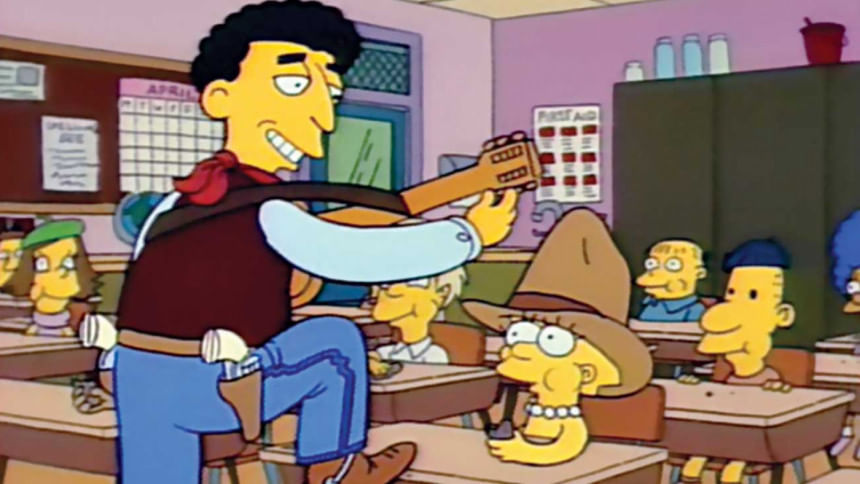The Simpsons and Economics: D'Oh!

In April 1991, Lisa Simpson's teacher, Miss Hoover took leave because she fell sick. A substitute teacher, Mr Bergstrom came. The episode Lisa's Substitute Teacher became famous because Dustin Hoffman stepped in to give the voice of Mr Bergstrom. Mr Bergstrom becomes very popular with Lisa and her classmates. Little does Mr Bergstrom or the viewers know this Simpsons episode silently teaches economics and accomplishes something that textbooks wrestle to make simple and easy.
A rumour is spreading that the Springfield Museum of Natural History will close down soon because people are not showing interest. Mr Bergstrom insists the class should visit the museum before it's too late. We don't know if the museum is privately or publicly run. All we know is, the museum does not charge an admission fee. Since there's no admission fee, the museum is non-excludable. Nobody can be excluded should they want to visit. The museum is almost never crowded. This means it is non-rivalrous: one person's use of the museum will not restrict the use of another person's visit to the museum. When the day comes, Lisa manages to take Homer Simpson with her to the museum.
When they arrive at the museum, Homer sees a notice: Suggested Donation $4.50. Homer asks the clerk, what does that mean? The clerk responds, "Sir you can donate any amount, but our suggested amount is $4.50." Homer asks back, "What if I decide to donate nothing?" This means, what if Homer decides to be a free-rider to the museum? Having found the individual benefits of visiting the museum without paying, being a free-rider, Homer encourages Mr Bergstrom to free-ride as well. Slowly and gradually, everybody follows Homer in being a free-rider. What happens in the end? Nobody makes a contribution to the maintenance of the museum. If nobody contributes to the maintenance of the museum, in the end, the museum can't run and has to shut down.
This is a classic example of a Public Good. Paul Samuelson identified this type of a good in 1954. These goods aren't free like the museum. But once these goods are produced nobody can be excluded (non-excludability) because they are consumed collectively by a group, like the museum. Most of the times, museums aren't crowded. Therefore, the additional burden of letting an extra person visit the museum is next to zero (non-rivalry). This is where the problem of free-riding arises. Everybody thinks their personal contribution of $4.50 doesn't make sense because they aren't creating traffic to visit the museum.
If each individual's extra consumption of the museum costs next to nothing, then there's no point in paying for admission. When we all think like this, the museum has to close down since nobody's paying. This is known as market failure. Now what to do? Somebody or some institution has to step in.
Since museums are a part of our heritage, they have many positive benefits that spillover to members of the community or society. Museums are therefore collectively enjoyed (consumed). Individual decision-making to fund will probably never work. The society demands museums stay open. If individual decision to pay for admission doesn't work, then the government, a governing authority or a philanthropic institute or individual needs to step in. This is where the responsibility of a government lies in any society.
Since its first episode on December 17, 1989, The Simpsons has been educating people around the world on textbook topics related to science, philosophy, economics, and game theory. If you've never watched The Simpsons, you don't know what you're missing. A big D'Oh to Homer and The Simpsons.
Source:
The Simpsons, Lisa's Substitute Teacher, April 25, 1991.
Further Reading:
The Simpsons & their Mathematical Secrets by Simon Singh. Bloomsbury, Oct 2013.
Homer Economicus: The Simpson and Economics. Editor: Joshua Hall. Stanford University Press, Jul 2014.
Asrar Chowdhury teaches economic theory and game theory in the classroom. Outside he listens to music and BBC Radio; follows Test Cricket; and plays the flute.
He can be reached at: [email protected]

 For all latest news, follow The Daily Star's Google News channel.
For all latest news, follow The Daily Star's Google News channel. 



Comments